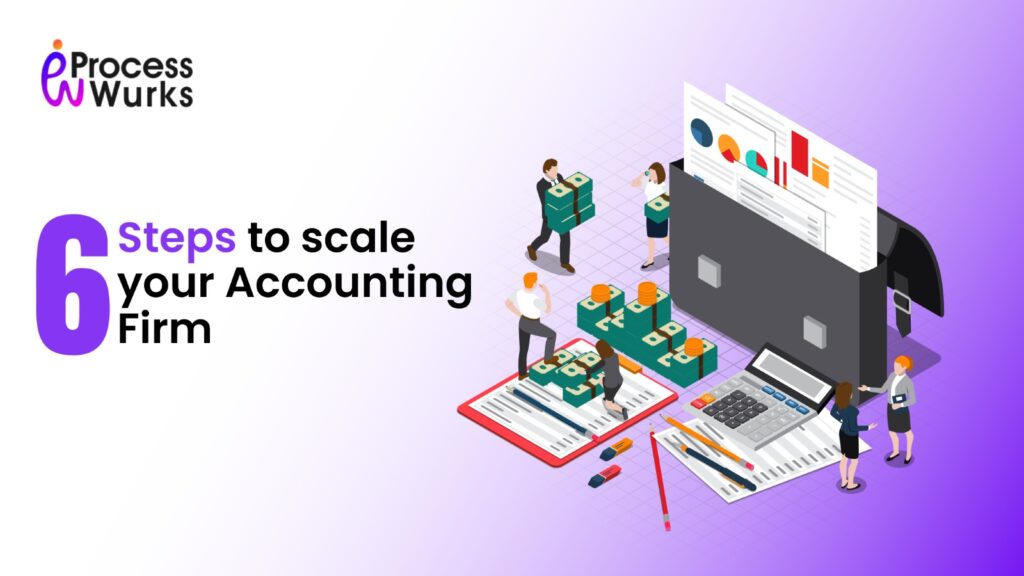
Share This Post
As accounting firms grow and take on more clients, they often face the challenge of scaling their operations to meet increased demand while maintaining quality service. Fortunately, there are proven 6 steps that accounting firms can take to scale their operations effectively. In this blog, we will explore these six essential steps that accounting firms can implement to streamline their processes, increase efficiency, and ultimately scale their business to achieve long-term success. Whether you are a small firm looking to Expand or a larger organization seeking to optimize your operations, these tips will help you take your accounting firm business to the next level.

Also Read: How to Create a Marketing Plan for Accounting Firm?
What Does it Mean to Scale a Business?
Scaling a business means growing the business in a way that lets it serve more people and make more money. This can be done by entering new markets, making more products, or getting better at sales and marketing.

Businesses need a clear plan for how they will grow if they want to grow well. They also need to put money into the right infrastructure and resources and set up systems and procedures to support a bigger business. Scaling a business can be hard, but if done right, it can be a very successful way to grow a business.
When Should You Scale a Business?
Scaling a business is not an easy feat. There are a lot of factors to consider, and the decision should not be taken lightly. As a business owner, you must ask yourself if now is the right time to scale.
Here are some things you should think about:
- Can Your Current Tools And Processes Handle Growth?
As your business grows, so does the number of people who buy from you and work for you. This means that your current systems and processes need to be able to handle the increase in volume. If they can’t, you should buy new ones.
- Have you Put Together the Right Team?
It’s a lot of work to grow a business, and you need the right people to do it. Do you already have enough people to handle the extra work? If not, you need to hire or train new people to work there.
- Do You Have The Money to Do What You Want to Do?
Taking a business to the next level can be expensive, so you need to make sure you have the money to do it. Have you saved enough money to pay for the prices of growth? If you don’t have enough money, you’ll need to raise money or find another way to pay for your growth.
- Is Your Product or Service Ready for the Market?
Before you scale your business, you need to make sure that your product or service is in demand. Do some study on the market to see if there is a need for what you’re selling. If not, you might want to wait until the market is ready to scale up.
5. Are you Ready for the Problems That Come With Growth?
There are problems that come up when a business grows. For example, do you think you’ll be able to handle the extra work? Have you made a plan for how to handle customer complaints? If not, you might want to think about whether now is the right time to scale or not.
These are just a few things to think about when choosing if your business is ready to grow. Before making a choice, take the time to carefully think about all of your choices. And if you’re still not sure, it’s best to talk to a professional who can help you make the best decision for your business.
Also Read: Business Ideas for Accounting Firms of next generation
How to Scale a Business in 6 Easy Steps
Creating a solid business plan is critical for any accounting firm looking to scale and achieve long-term success. In the ever-changing business world, it’s important to stay ahead of the curve and continually look for ways to increase productivity and profitability. By following the six essential steps to scale your accounting firm’s business plan, you can create a roadmap for growth that includes evaluating your current processes and systems, building the right team, securing financial resources, assessing market demand, and preparing for the challenges that come with growth. With 6 steps to scale your accounting firm successfully scales its operations and achieves sustainable success.

Here are 6 steps you can take to scale your business:
- Define Your Target Market
The first step to growing your business is to be very clear about who you want to sell to. This means figuring out who your perfect customer is and what they want and need. Once you know who you want to reach, you can come up with a good marketing plan.
- Create a Sales Funnel
The next step is to set up a sales process that will turn leads into customers. To do this, you have to make content and deals that make people want to buy. You also need a plan for following up and finishing the deal.
- Streamline Your Operations
To grow your business, you must simplify how it works. This means getting rid of time- and money-wasting or useless steps. By making your business more efficient, you’ll be able to grow more quickly.
- Automate What You Can
Automating some jobs is another way to improve how well things work. This can give you and your team more time to work on more important things. There are many types of apps that can help you automate different business tasks.
Also Read: Essential Workflow Automation For Accountants
- Train And Hand Off
As your business grows, you’ll need to train new employees and give them jobs. This will make sure your business runs easily and well. Also, it’s important to write down all the steps so that anyone can follow them.
- Check And Make Changes
The last step in growing your business is to keep track of your success and make changes as needed. This means setting goals and measuring your results so you can see what’s working and what needs to be changed. By reviewing and changing your method all the time, you’ll be able to grow your business better.
Scaling up a business can be hard, but it’s a necessary part of growth. By taking these steps, you can simplify your business and make it work better. You will also be able to reach your target audience better and make more sales.
Benefits of Scaling a Business
Scaling a business means growing it in a way that lets it keep making more money and more money over time.

There are many benefits to scaling a business, including the following:
Increased Earnings
Businesses can make a lot more money if they have more users and sell more.
Improved Efficiency
When a business grows, it often becomes more efficient because processes are streamlined and better to meet the increased demand.
Greater Reach
Companies that grow well can reach more people and get more customers, which leads to even more growth.
Increased Fighting Edge
Smaller competitors are often harder for a bigger company to beat, which gives the bigger company a big edge in the market.
Increased the Value for Shareholders
When a business grows, it becomes more useful and attractive to investors, which can create a lot of value for the shareholders.
Growing a business can be hard, but it can also be very rewarding for people who are good at it. Companies can set themselves up for long-term success if they know how growing can help them.
The Differences Between Scaling and Growing a Business
There are a few important differences between building a business and growing it. When you scale a business, you usually focus on making it run more smoothly by making it more efficient and automating tasks. When you want to grow a business, on the other hand, you usually focus on getting more customers or entering new areas.

Scaling is all about being efficient. The goal is to do more with less, whether that means simplifying processes, streamlining operations, or making the customer experience better. To achieve economies of size, scaling a business means making it easier and cheaper to run.
Growing a business involves adding new customers or expanding into new markets. The goal is to increase revenue by raising the top line. This can be done through marketing and sales initiatives, new product development, or expansion into new geographies.
While scaling and growing a business is important, they require different approaches. The right approach for your business will depend on your specific goals and objectives.
Mistakes to Avoid When Scaling a Business
When it comes to scaling a business, many mistakes can be made.
Here are some of the most common mistakes and what you can do to avoid them:
- Not defining your target market
Before you start growing your business, you should have a clear idea of who you want to sell to. If you try to reach out to everyone, your message will get lost.
- Not defining your value statement
What makes your business unique? Why should someone buy from you instead of your competition? If you can’t answer these questions, your business will be hard to grow.
- Not spending on marketing
Many businesses think they can grow without spending money on marketing, which is a mistake. But marketing is important if you want to find new customers and grow your business.
- Not making plans to grow
Many businesses make the mistake of thinking that they can handle any kind of growth. But this isn’t always the case, and if a business isn’t ready for growth, it can quickly become too big to handle.
- Too fast of a growth
It’s important to grow your business at a pace that you can keep up with. When a business grows too quickly, it can cause problems like cash flow issues and trouble meeting orders.
If you don’t make these mistakes, you’ll be well on your way to growing your business.
Conclusion:
In conclusion, scaling your accounting firm can be a daunting task, but with the right approach, it can be done successfully. By following the six steps outlined in this blog, you can create a solid plan for growth that includes assessing your current processes, building the right team, securing financial resources, evaluating market demand, and preparing for the challenges of growth. Remember that scaling a business takes time and effort, but the rewards can be significant. With careful planning and execution, you can take your accounting firm to the next level and achieve long-term success.
Editor’s Choice-
Essential Workflow Automation For Accountants
How Can Tax Technology Help Increase Efficiencies And Improve Company Performance?
Best Accounting Software for US Businesses in 2023
Great Social Media Post Ideas for Accountants
Driving Foot Traffic and Increasing Awareness with Facebook Local Business Ads
Want to automate your firm? Try ProcessWurk free trial today
ONE Software to run your entire business. From Marketing to Sales to Client on-boarding to Client deliverables to Firm Operations
More To Explore





